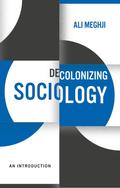Decolonizing Sociology
An Introduction

1. Auflage Dezember 2020
200 Seiten, Hardcover
Wiley & Sons Ltd
Kurzbeschreibung
Sociology, as a discipline, was born at the height of global colonialism and imperialism. Over a century later, it is yet to shake off its commitment to colonial ways of thinking.
This book explores why, and how, sociology needs to be decolonized. It analyses how sociology was integral in reproducing the colonial order, as dominant sociologists constructed theories either assuming or proving the supposed barbarity and backwardness of colonized people. Ali Meghji reveals how colonialism continues to shape the discipline today, dominating both social theory and the practice of sociology, how exporting the Eurocentric sociological canon erased social theories from the Global South, and how sociologists continue to ignore the relevance of coloniality in their work.
This guide will be necessary reading for any student or proponent of sociology. In opening up the work of other decolonial advocates and under-represented thinkers to readers, Meghji offers key suggestions for what teachers and students can do to decolonize sociology. With curriculum reform, innovative teaching and a critical awareness of these issues, it is possible to make sociology more equitable on a global scale.
Sociology, as a discipline, was born at the height of global colonialism and imperialism. Over a century later, it is yet to shake off its commitment to colonial ways of thinking.
This book explores why, and how, sociology needs to be decolonized. It analyses how sociology was integral in reproducing the colonial order, as dominant sociologists constructed theories either assuming or proving the supposed barbarity and backwardness of colonized people. Ali Meghji reveals how colonialism continues to shape the discipline today, dominating both social theory and the practice of sociology, how exporting the Eurocentric sociological canon erased social theories from the Global South, and how sociologists continue to ignore the relevance of coloniality in their work.
This guide will be necessary reading for any student or proponent of sociology. In opening up the work of other decolonial advocates and under-represented thinkers to readers, Meghji offers key suggestions for what teachers and students can do to decolonize sociology. With curriculum reform, innovative teaching and a critical awareness of these issues, it is possible to make sociology more equitable on a global scale.
1. The Decolonial Challenge to Sociology
2. Beyond Intellectual Imperialism: Indigenous and Autonomous Sociologies
3. Walking while Asking Questions: Towards a 'Sociology in Conversations' Conclusion: Sociology and the Decolonial Option
Syed Farid Alatas, National University of Singapore
"In this well-written and lively book, Ali Meghji makes the 'decolonial' project accessible to a wide audience of students and scholars. A welcome guide to a complex intellectual terrain that social scientists can no longer ignore."
Julian Go, author of Postcolonial Thought & Social Theory
"Its main audience are those sociologists unfamiliar with the [decolonizing] perspective - in other words, the majority of sociologists. [...] Yet, the way in which Ali Meghji threads together the different decolonial arguments and elaborates on his own decolonial sociology program makes this more than just an introductory book. It is also a contribution to further the decolonial conversation. [...] It ought to be read by all sociologists."
José Itzigsohn, Sociology of Race and Ethnicity
"Meghji offers a unique and highly valuable contribution to the discipline that goes beyond merely outlining these issues to show how they are reflected and implemented in everyday practice. I would recommend this book as required reading for all undergraduate and postgraduate sociology courses [...] applying a decolonial approach to teaching that factors in the numerous insightful and well-articulated justifications for change that Meghji so eloquently outlines."
Tanisha Spratt, The Sociological Review
"the high point of the book [...] takes us through what [Meghji] calls 'a Sociology in Conversations', where he discusses the necessity of having a horizontal approach to knowledge production [...] A decolonial sociology should allow us to think less about 'things' and more about relationships."
Rochelle Smith, Ethnic and Racial Studies
"A manifesto and rallying-cry, aimed at changing how sociology has been customarily done, critiquing inherited Eurocentric biases in thematics, theory and methodology, and correcting them with post-, anti- and de-colonial pedagogic and research practices."
David Inglis, European Journal of Social Theory


